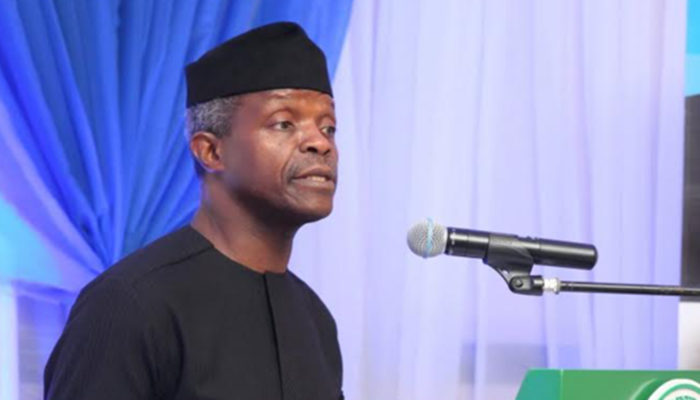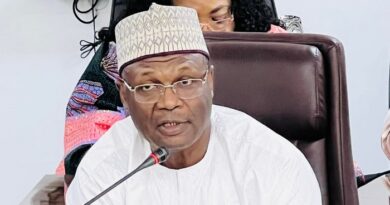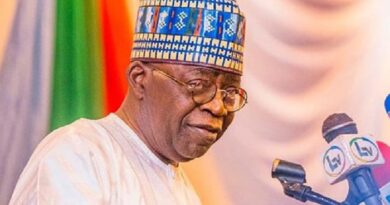Dapchi abduction rekindles our resolve to permanently subdue terrorism in Nigeria – Osinbajo
*Says Boko Haram war must henceforth be fought on all fronts; from the financial networks that sustain terrorists to the cyberspace that amplifies their noise
“But there should be no room for self-pity or frustration on our part. The Dapchi and Rann incidents should, if anything, rekindle our determination, as Nigeria’s Armed Forces, as security forces, as the Government entrusted with the protection of the lives and property of Nigerians, to permanently subdue terrorism in Nigeria.
“The President has asked me to Chair an inter-ministerial team to plan and implement the physical and social rebuilding of such communities and this is a task which we have set for ourselves and which we must accomplish because it is important for those communities to understand that they have not been abandoned.
“…We must fight them on multiple fronts, starve them of funding and resources, of sympathisers, and of the oxygen of publicity, especially on the Internet.
“National Armed Forces must learn the art of rapid evolution and adaptation. They must focus their energies not just on expanding conventional reach but also on developing a robust capacity to take the fight outside their comfort zones: from the financial networks that sustain terrorists to the cyberspace that amplifies their noise.”
Below is the full text of the Vice President’s address:
KEYNOTE ADDRESS DELIVERED BY HIS EXCELLENCY, PROF. YEMI OSINBAJO, SAN, THE VICE PRESIDENT, FEDERAL REPUBLIC OF NIGERIA AT THE 8TH NATIONAL SECURITY SEMINAR ORGANISED BY ALUMNI ASSOCIATION OF NATIONAL DEFENCE COLLEGE (AANDEC), AT THE NATIONAL DEFENCE COLLEGE, ABUJA ON TUESDAY MARCH 6, 2018.
PROTOCOLS
Permit me to begin by saluting our men and women of our Armed Forces, stationed across Nigeria, striving in the face of unimaginable odds, to keep us safe from terrorists, bandits and criminals of all shades. As difficult as things might occasionally appear to be, we know that they would be much worse without the gallant and diligent efforts of our Armed Forces. You have displayed remarkable bravery and professionalism and we are immensely proud of your sacrifice and all that you have achieved on our behalf.
This year makes it nine years since our nation was first confronted with what perhaps has become the most persistent threat to national security in decades, the scourge of Boko Haram. But as of the end of 2016, Boko Haram as a fighting force had been effectively degraded. Yet, time and time again we are confronted with the question “I thought you said Boko Haram had been defeated? And this question arises especially after one cowardly or opportunistic act or the other.
To provide some guide to an answer, perhaps it might be useful to put in context the nature of the war against terror, the character of the terrorists which informs their strategy and tactics, and the trajectory of the war and then perhaps a prognosis for the future.
Boko Haram is a Salafist-Jihadi terrorist group, their particular strain of false ideology is one which rejects the authority of the state and seeks to take over Nigerian territory establishing a caliphate, a copy of the so called Islamic state of the Levant (ISil), or ISIS
Between 2012 and early 2015 they seemed to be well on the way to achieving their objective of challenging the sovereignty of Nigeria and contesting territory with it. As of March 2015, Boko Haram controlled about 20,000 square miles of Nigerian territory – about the size of Belgium: An area stretching from the Mandara Mountains on the eastern border with Cameroon to Lake Chad in the north and the Yedseram River in the west. In Borno, 20 out of 27 LGS were under BH control, including Mubi in Adamawa and several villages in Yobe State.
In addition, their bloody footprints reached Abuja, Kano, and Kaduna, including the bombings of the UN building and police headquarters in Abuja. That was the state of affairs as of early 2015.
Today they do not occupy any local government area in Nigeria and they no longer have the capacity to hold territory or challenge the sovereignty of the State.
Gone also are the days when our military was on the back foot, under-equipped, under-inspired. Gone are the days when the footprints of the terrorists have become strayed well beyond the Northeast, leaving behind scenes of widespread carnage and sorrow as far away as Abuja and Kano.
What we have today is what used to be a fighting force now operating as disparate criminal bands, mostly in relatively small groups, taking opportunistic hits at communities, suicide bombings using children who usually do not understand that their actions would kill them and others & the kidnapping of innocent persons, especially women and even children.
So today, Boko Haram knows that they are no longer a relevant fighting force, their objective of establishing a caliphate within Nigeria is impossible. But they certainly want to give the impression that they are really an army to be reckoned with. This is the deception that is at the heart of terrorism everywhere. And in order to defeat terror we must as a people and government understand this reality.
To put it more graphically, the terrorist is essentially is essentially a murderous psychopath. The tactic is to commit heinous opportunistic killings, the objective is to horrify, terrify and create fear and uncertainty. So the killing, for example, of the Buni Yadi boys on their beds in a secondary school exactly four years ago, the numerous mindless bombings in mosques and churches full of worshippers are meant to achieve this warped purpose.
What the terrorist wants to achieve is the impression that they are a powerful force capable of subduing our regular defense forces, and they do so now by acts of spectacular violence, and boastful videos on social media. An important part of their tactics is to create the impression that they have not been defeated and that they will always be around and they will always be a threat to national security.
It is important to recognize that this is a fundamental plank of terrorism, the deliberate promotion of the impression that they possess military capacity which they clearly do not have and by random criminal acts creating the impression that the battle is not over and it will not be over.
This is by no means unique to Nigeria. All around the world countries are confronted with a similar challenge. In November 2015, France came face to face with great tragedy, a series of coordinated attacks that claimed more than a hundred lives in Paris, the capital. Responding to that attack, President Hollande said, and I quote: “What the terrorists want is to scare us and fill us with dread.”
That is precisely what terrorists all over the world seek to do. And to accomplish this goal, terrorists have mastered the art of morphing and evolving and adapting, for the purposes of furthering the primary objective of sowing panic and fear among the general population.
A month after those horrific Paris attacks, the United States suffered the San Bernardino shootings, in which a couple, who appeared to have been radicalized on the Internet, shot, killed and wounded 38 persons. Then President Barack Obama, in a speech shortly after that attack, said, and I quote: “Over the last few years… the terrorist threat has evolved into a new phase. As we’ve become better at preventing complex multifaceted attacks like 9/11, terrorists turn to less complicated acts of violence like the mass shootings that are all too common in our society…”
We must recognize that Nigeria’s battle against terrorism is one that has taken the form of plain criminal acts, committed randomly.
Going by the experiences of even the most militarily advanced Western countries, this is not a war in any traditional sense. What we are seeing now are random criminal acts over a large area of territory.
The first and second World Wars and all other wars like that clearly had beginnings and endings, as did the Vietnam War and the Biafran War and many others. But the world has come to realise that the War on Terrorism is different. Today’s enemies, loosely-structured non-state Actors, sometimes faceless, and they choose to mutate, they choose to transform themselves. They will alter their goals and objectives at random, and are capable of doing anything and everything to continue feeding off the oxygen of media.
The media is an important part in promoting terrorism because the terrorists need the media; the media is its most important tool. The more spectacular their actions and the more spectacularly depicted it is in the media, the greater the sense that indeed this is a legal fighting force.
Yet this should not be interpreted as meaning that we are fighting an unwinnable war. We can boldly say that today Boko Haram is no longer a serious fighting force.
But we have to be strategic in our approach, responding not out of panic or fear, but out of a determination to secure our nation and keep our people safe not only from terrorism but from every other threat they face. We must fight them on multiple fronts, starve them of funding and resources, of sympathisers, and of the oxygen of publicity, especially on the Internet.
National Armed Forces must learn the art of rapid evolution and adaptation. They must focus their energies not just on expanding conventional reach but also on developing a robust capacity to take the fight outside their comfort zones: from the financial networks that sustain terrorists to the cyberspace that amplifies their noise.
Will there occasionally be what seem to be setbacks in the war on terror? The unpalatable but realistic answer is yes. Again this is by no means unique to Nigeria. Two weeks ago one such incident took place, in the town of Dapchi, in Yobe State. Boko Haram terrorists abducted 110 girls while they were in their dormitory at night – a despicable, dishonorable act.
And then last week, the attack on a humanitarian camp – a humanitarian camp is a place where people are being taken care of by persons who have dedicated their lives to taking care of others, but that is the sort of place where you would not expect any sensible person to attack but that is exactly the sort of place you find terrorists attacking.
Both incidents have received widespread condemnation from around the world. They are reminders of the absolute ruthlessness of the enemy – and the fact that it will resort to increasingly desperate and callous moves on our most vulnerable people and places and the important thing is this is given the sort of publicity that they wish.
Very often, the campaign of violence is foiled, thankfully. Towards the end of 2017 the Global Terrorism Index reported that terrorism deaths in Nigeria fell by 80 percent between 2015 and 2016. That figure of 80 percent represents countless Boko Haram attacks prevented from happening by the efforts of the Nigerian military. We must never forget that.
Frustratingly, however, all that a terrorist group requires to be deemed extraordinary is for it to record a high-profile success every now and then. I am reminded of what the Irish Republican Army (IRA) told former British Prime Minister Margaret Thatcher, after an unsuccessful bomb attempt on her life in 1984: “We only have to be lucky once – you have to be lucky always.”
So, clearly, the job of governments and militaries is never an easy one, especially when you’re dealing with an unconventional enemy, who only needs to be lucky once.
But there should be no room for self-pity or frustration on our part. The Dapchi and Rann incidents should, if anything, rekindle our determination, as Nigeria’s Armed Forces, as security forces, as the Government entrusted with the protection of the lives and property of Nigerians, to permanently subdue terrorism in Nigeria.
I’m aware that since the incident happened Nigeria’s security and intelligence chiefs have all mobilized to Yobe State and environs, and have been re-assessing their strategies and approaches to securing lives and property and containing the ongoing threat that is Boko Haram. More than ever before, we are mobilizing to ensure that schools in the Northeast are kept secured from Boko Haram. We are working with several groups including some groups on the Safe Schools Initiative to ensure that our schools are better protected from the kinds of the opportunistic attack that we saw in Dapchi.
President Buhari is deeply concerned about the security situation across the country, and has repeatedly expressed this. Uppermost on his mind is the fact that he was elected to a large extent based on the vow to secure Nigeria and restore the pride of our military.
As commander, at various times in his career, of three of the four Divisions of the Nigerian Army that existed at the time, the President fully understands the threats and the issues. He also understands the importance of not being driven by panic, and of taking the time to build the coalitions and collaborations without which enduring security would be impossible in Nigeria.
You will recall that one of the first things he did when we took office was to visit all of our neighbouring countries, as part of efforts to revitalise the Multinational Joint Task Force, whose contributions to the successes so far have been invaluable. Prior to that time relations with some of our most important neighbours were needlessly tense. We have also spent the last two years rebuilding damaged relationships with longstanding allies and partners like the United States.
Our current focus is the strengthening of Nigeria’s intelligence gathering capacity. For this to happen intelligence gathering must not be seen as solely a task for law enforcement agencies. It is a task that must involve every citizen, every community. And at the level of the military and intelligence agencies, intelligence-sharing must become the rule and not the exception.
We must acknowledge that there is a limit to what our Armed Forces can achieve by the conventional means of establishing barracks and bases. It is very easy to forget the scale of what we are dealing with; for example, just how large many states in the North are. Take Borno for example, which is bigger than all of the following ten States combined: Lagos, Anambra, Imo, Ebonyi, Abia, Ekiti, Akwa Ibom, Enugu, Osun and the FCT combined. And this is only Borno State – there are still five other states besides it in the Northeast.
Land mass on that scale is unquestionably a delight for terrorists and their unconventional tactics. The primary advantage that the Government should have over them is in intelligence gathering; the ability to expertly assemble the pieces of various puzzles together in order to be able to progressively contain and limit terrorism.
Without investing in intelligence gathering – which, by the way would also include building and sustaining the trust required to spur local communities to be forthcoming with information – there would be very little hope for us as a country at the mercy of large swathes of ungoverned spaces and borders.
This necessity of robust intelligence gathering underlies every one of our security challenges in Nigeria, not just terrorism but also clashes between herdsmen and farmers, cattle rustling, armed banditry, cultism and militancy.
In the herdsmen, farmer crisis we have seen that herdsmen attackers have included armed confederate from neighboring North African countries, especially Libya which has in the past few years been a repository of small arms. The movement of people across our borders; the infiltration of normally quiet and peaceful communities is an intelligence gathering challenge and it must be solved.
We must significantly upgrade our capacity to collect intelligence, as well as build a culture of sharing it amongst our military and law enforcement agencies in a timely manner.
We must also increasingly depend on cutting-edge technology to make this task easier. Cutting-edge technology will allow you better anticipate and predict the antics of terrorists, increase our capacity to surprise them before they surprise us, and it will make it far less likely that tragic recent events like Dapchi and Rann will ever happen again.
We know of course that Boko Haram was taking its inspiration from somewhere, from ISIS in the Middle-East, specifically. Among other things Boko Haram quickly learned that a terrorist group can benefit as much from its media operation as from its armed warriors.
What it will take to win the war against terror is first of all to win the minds of young men and women fed with the false ideologies that promote terrorism. We must do so through the media, through the means by which they were radicalized. We must develop counter narratives that answer the questions and debunk the false ideologies that these young people have been fed with. I am aware that a lot have been done in this regard through the de-radicalization efforts of the national security agencies.
Second is to continuously address the material conditions that make it attractive for some young men and women to take up arms against innocent people as an option for economic survival. We must ensure that our economic planning is responsive to the needs of the growing number of our young people, some of whom are uneducated and required to be educated and equipped with the skills to make themselves useful.
Third is to rebuild and secure the communities destroyed by terrorist acts. The President has asked me to Chair an inter-ministerial team to plan and implement the physical and social rebuilding of such communities and this is a task which we have set for ourselves and which we must accomplish because it is important for those communities to understand that they have not been abandoned. It is important for them to understand that aside from their security, the fact that they were attacked and their communities destroyed is a responsibility which Federal Government and the various state governments take very seriously.
It is the responsibility of government to protect the lives and livelihoods of the citizens, where that is breached whether it is by terrorist acts or by clashes between communities, it is the duty of government to ensure that some form of rebuilding and some form of rehabilitation and in some cases, compensation is paid.
I want to just emphasize as I close that the important feature of what we have been seeing in terrorism and clashes in our country is the fact that very frequently we allow situations where anything can be said, anything can be done, where the hate that promotes terrorism and clashes continues.
It is important for the Nigerian elite to understand that we owe a duty to ensure that we do not promote any of the types of prejudices that can cause clashes and divisions in our communities. After people have fought and killed themselves, after communities have been destroyed, when we sit down and reflect over what had happened, we realize that what ought not to have been said were said and things that ought not to have been done were done. The type that we created the sort of conduct and divisions that created those circumstances.
I think that it is the duty of every one of us, I speak all of us who represent the Nigerian elite, that it is our duty in particular, to hold this country together especially by our utterances and by the sort of utterances that we promote.
While thanking you for listening, it is now my honour and privilege to declare this seminar open.




